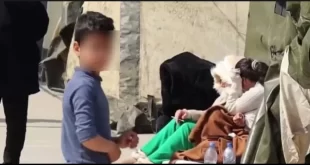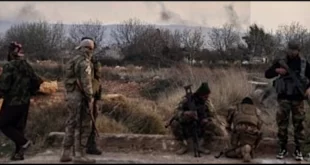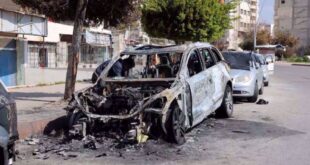The following article is republished from Mideast Discourse.
Conditions for Syrian refugees in Lebanon are so dire that many risk death by escaping by sea. This is the consequence of the failed regime change operation launched by the US Coalition against Syria in 2011 and the US economic sanctions on Lebanon of two years ago.
by Steven Sahouinie, Syrian journalist based in Latakia
A 10-meter (33-foot) yacht built in 1974, equipped with two motors, left Tripoli, Lebanon on Saturday with about 60 migrants onboard, including women and children. Six people, including an 18-month-old girl, Taleen Al-Hamwi, and two women died with more than 10 people still missing after the boat sunk.The boat was headed to Cyprus, an island 175km (109 miles) away, with both Syrian and Lebanese passengers. Lebanese naval forces chased the illegal migrant boat out to sea. Survivors reported the naval ship had deliberately crashed into the migrant boat.
“The patrol boat crashed into us twice … to drown us,” a surviving man told AFP news agency at the port, before he was silenced and carried off by a crowd of survivors’ relatives.Wet and shivering, a young survivor said shortly after midnight on Saturday, “The security cruiser chased us, and the officers on board said they would bury us. Then, they rammed the boat in the middle and on the sides until it sank.”Lebanese Social Affairs Minister, Hector Hajjar, attempted a press conference in Tripoli, but victims’ families hurled insults at him and the other officials present. Angry protesters in Tripoli destroyed a military medical center amid calls to take to the city’s streets and “declare a major escalation.”Colonel Haitham Dannawi, commander of the naval forces, accused the boat’s captain of trying to escape and crashing the vessel into the naval forces’ cruiser. Dannawi said the forces tried to thwart the smuggling operation before the ship sailed out of the Qalamoun region, south of Tripoli, which later led to a sea chase involving two naval patrols trying to force the migrant boat to turn back.“Unfortunately, the captain [of the migrant boat] decided to carry out maneuvers to escape,” said Dannawi. He added, “In less than five seconds, the boat was under water.
” He said that passengers were quickly handed life jackets and added, “The patrol that followed the boat a few miles from the shore and in the territorial waters tried to urge it to return because the situation was not safe and, if we did not stop the boat, it would have sunk outside the territorial waters.”Despite the eye witness accounts of survivors, Dannawi continued his defense of the naval vessels, “The boat sank quickly because of the overload and were it not for the presence of our forces near it, the number of victims would have been greater.””The Lebanese military saved at least 47 people, but we don’t know how many more are missing because we don’t know the total number of those aboard,” said Lebanese transport Minister Ali Hamie.Tensions were rising in Tripoli on Sunday as relatives of the victims gathered in agitated crowds outside hospitals where those injured in the sinking were receiving treatment. A fight broke out between soldiers and the families of the dead and survivors at the port of Tripoli after the tragedy.”I was with them.
I managed to get out,” said Mohammad Damnawi, a Lebanese man who survived the boat sinking, but he didn’t know if his wife and son had survived.“Even when we are trying to run away from the filth of politicians and their corruption … death catches up with us,” said Nissrine Merheb, who hasn’t heard from her five relatives since they embarked on the deadly voyage.Kassem al-Zoeibi, whose relatives had survived the sinking, said they had tried to flee Lebanon out of desperation. He added, “Why did they choose this way? It is because there is no way but this way.”Lebanese Prime Minister Najib Mikati announced a national day of mourning on Monday; however, protests have been called for outside the Tripoli home of Mikati.The latest tragedy stoked public anger in Tripoli, Lebanon’s second city and one of the poorest and most neglected regions even before the current economic crisis. The city is also home to tens of thousands of Syrians who fled the war that broke out in March 2011.
Many of those taking the boats have been Syrian refugees. Growing poverty and unemployment rates have turned Tripoli into a launch pad for migrants.Lebanese are attempting to flee a country facing multiple crises and an unprecedented economic and financial collapse. Escaping poverty shows the depths of desperation the country has never faced before. Corruption and mismanagement are blamed as the root causes of the crisis which was acerbated by the COVID-19 pandemic. Protesters called for a complete revolution as street protests turned violent after banks were shut down and life savings were frozen. The massive Beirut port explosion added to the unrest and despair among a population that has long given up on its leaders. According to the World Bank, the financial crisis is the worst in 150 years.Lebanon’s economic crisis has seen the local currency lose more than 90 percent of its value and pushed waves of Lebanese as well as Syrian refugees to try the dangerous sea journey to Europe on small boats. In 2019, the army stopped 21 boats carrying 707 people, and in 2020, the army stopped four boats carrying 126 people.In September 2020, Mohammed Sufian of Tripoli was rescued by a UN naval force after trying to migrate with his family on a boat to Cyprus. He ended up losing his two-year-old son as a result of severe heat with no food or water on board. Mohammed was among dozens of people who have tried to flee Lebanon to Europe amid the economic and financial crisis, which left the majority of the population living below the poverty line.The UN refugee agency says at least 1,570 people, 186 of them Lebanese, left or tried to leave by sea from Lebanon between January and November 2021.Former Prime Minister Saad Hariri called for a “quick investigation that reveals the circumstances and determines the responsibility. Otherwise, we have something else to say.
”He tweeted: “When conditions force Lebanese citizens to resort to death boats to escape from the state’s hell, this means that we are in a fallen state. Tripoli is announcing today this fall through its victims. The testimonies of the victims of the death boat are dangerous, and we will not allow (these testimonies) to be buried in the sea of the city.”Saad Hariri served as the prime minister of Lebanon from 2009 to 2011 and 2016 to 2020; however, in January he announced he was suspending his role in political life and would not run in another election. He has since taken up private residence in the Gulf.Just days later after the announcement, his older brother, Bahaa Hariri, declared he was entering Lebanese politics. In a recent conference, Bahaa Hariri said, “The parliamentary elections in May have never been so important. Lebanon faces a bleak future, with no jobs for workers, no fuel at the gas stations and food at record prices.”
Steven Sahiounie is a two-time award-winning journalist
 Syria Support Movement solidarity with the Syrian people
Syria Support Movement solidarity with the Syrian people




